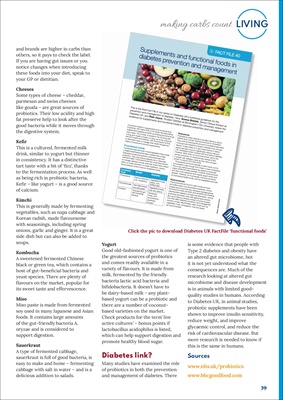
39
LIVING
making carbs count
and brands are higher in carbs than
others, so it pays to check the label.
If you are having gut issues or you
notice changes when introducing
these foods into your diet, speak to
your GP or dietitian.
Cheeses
Some types of cheese - cheddar,
parmesan and swiss cheeses
like gouda - are great sources of
probiotics. Their low acidity and high
fat preserve help to look after the
good bacteria while it moves through
the digestive system.
Kefir
This is a cultured, fermented milk
drink, similar to yogurt but thinner
in consistency. It has a distinctive
tart taste with a bit of 'fizz', thanks
to the fermentation process. As well
as being rich in probiotic bacteria,
Kefir - like yogurt - is a good source
of calcium.
Kimchi
This is generally made by fermenting
vegetables, such as napa cabbage and
Korean radish, made flavoursome
with seasonings, including spring
onions, garlic and ginger. It is a great
side dish but can also be added to
soups.
Kombucha
A sweetened fermented Chinese
black or green tea, which contains a
host of gut-beneficial bacteria and
yeast species. There are plenty of
flavours on the market, popular for
its sweet taste and effervescence.
Miso
Miso paste is made from fermented
soy used in many Japanese and Asian
foods. It contains large amounts
of the gut-friendly bacteria A.
oryzae and is considered to
support digestion.
Sauerkraut
A type of fermented cabbage,
sauerkraut is full of good bacteria, is
easy to make and home - fermenting
cabbage with salt in water - and is a
delicious addition to salads.
Yogurt
Good old-fashioned yogurt is one of
the greatest sources of probiotics
and comes readily available in a
variety of flavours. It is made from
milk, fermented by the friendly
bacteria lactic acid bacteria and
bifidobacteria. It doesn't have to
be dairy-based milk - any plantbased
yogurt can be a probiotic and
there are a number of coconutbased
varieties on the market.
Check products for the term' live
active cultures' - bonus points if
lactobacillus acidophilus is listed,
which can help support digestion and
promote healthy blood sugar.
Diabetes link?
Many studies have examined the role
of probiotics in both the prevention
and management of diabetes. There
is some evidence that people with
Type 2 diabetes and obesity have
an altered gut microbiome, but
it is not yet understood what the
consequences are. Much of the
research looking at altered gut
microbiome and disease development
is in animals with limited goodquality
studies in humans. According
to Diabetes UK, in animal studies,
probiotic supplements have been
shown to improve insulin sensitivity,
reduce weight, and improve
glycaemic control, and reduce the
risk of cardiovascular disease. But
more research is needed to know if
this is the same in humans.
Sources
www.nhs.uk/probiotics
www.bbcgoodfood.com
Click the pic to download Diabetes UK FactFile 'functional foods'